About Aloo ki Sabji
There’s hardly anytime that you can go wrong with either potatoes, tomatoes or a combination of both. Especially in Indian cuisine, these 2 vegetables are the simplest to work with, yet make for amazingly delicious dishes. At home as well, the pairing like in this Aloo Tamatar Ki Sabji makes for a comforting dish. I’ve said this in my other posts, but I’m going to reiterate – it is almost a critical situation at home, if there is no aloo or tamatar in my vegetable tray. Whether other veggies are there or no, these two have to be there always. Like, literally always! And the simplest way I can bring these 2 together in a dish is this Aloo Tamatar Sabzi. Also, whether I’m keeping a fast or not, I often make this Aloo ki Sabji for my family. The fact that it is a fancy free, low on spices and light curry is what makes it special. Sometimes, you have days when you just want to eat a curry, but a soothing one. And not the typical rich one. Those days, this Aloo Tamatar Sabzi is a savior. I’m saying this again, a potato or aloo is a very friendly and handy vegetable, especially for home cooks. This root vegetable is good on its own or in company with other veggies/leafy greens like green peas, tomatoes, carrots, spinach, cauliflower, beans, fenugreek leaves, capsicum and more. Usually, I make this Aloo Tamatar Ki Sabji with pooris and often as a breakfast. But, for that set up, I tend to add onion and garlic in it. Since the recipe in this particular post is dedicated to Navratri fasting, I have made the recipe without onion, garlic and spiced it just with cumin, red chili powder and black pepper powder. So, when you make the Aloo Tamatar ki Sabji this way, you can serve and relish it with similar vrat friendly accompaniments like Vrat Ki Roti, Singhare Ki Poori, Rajgira Paratha or Rajgire Ki Poori. I also have another potato-based dish apt for your fasts, called the Vrat Ke Aloo, which is equally tasty.
How to make Aloo ki Sabji
Cook Potatoes
- Pour 1.25 to 1.5 cups water in a 2-liter stovetop pressure cooker or pan. Rinse well in water a few times and add the 2 medium-sized potatoes and some edible rock salt (sendha namak). Boil the potatoes for 2 to 3 whistles on medium-heat. The potatoes should be just cooked. They should not become crumbly or mushy. Let the pressure drop naturally in the cooker, then only open the lid. Remove the cooked potatoes and set aside to cool.
- Let the potatoes cool slightly or become warm. Peel and chop them.
- Keep all the ingredients ready for making Aloo Tamatar Sabzi.
Make Aloo Tamatar Ki Sabji
- Heat 1 tablespoon oil in a pan. You can also swap the oil with ghee if you prefer.
- Add 1 teaspoon of cumin seeds and let them splutter on low heat.
- Then, add 4 medium sized chopped tomatoes – about 2 cups of finely chopped tomatoes.
- Sauté till they become soft stirring often on medium-low to medium heat.
- Continue to sauté the tomatoes till they soften and become pulpy.
- Then, add ¼ teaspoon red chilli powder, ¼ teaspoon black pepper and edible rock salt as required. You can also add regular salt if not making for fasting.
- Stir and mix well to combine.
- Add the chopped boiled potatoes and stir to mix again.
- Add 1 cup of water.
- Stir and let the gravy cook on low heat for 7 to 8 minutes or till it thickens slightly.
- Slightly mash a few potato pieces with a spoon to help in thickening the gravy.
- Garnish with chopped coriander leaves and serve Aloo Tamatar ki Sabji hot or warm with your preferred flatbread like roti or paratha or puri. Please be sure to rate the recipe in the recipe card or leave a comment below if you have made it. For more vegetarian inspirations, Sign Up for my emails or follow me on Instagram, Youtube, Facebook, Pinterest or Twitter. Aloo Gobi (2 Ways) | Aloo Gobi ki Sabji & Curry Aloo Matar Recipe | Punjabi Aloo Mutter Easy Jeera Aloo Recipe in 30 minutes Aloo Posto Recipe This Aloo ki Sabji from the archives first published in October 2013 has been updated and republished on December 2022.
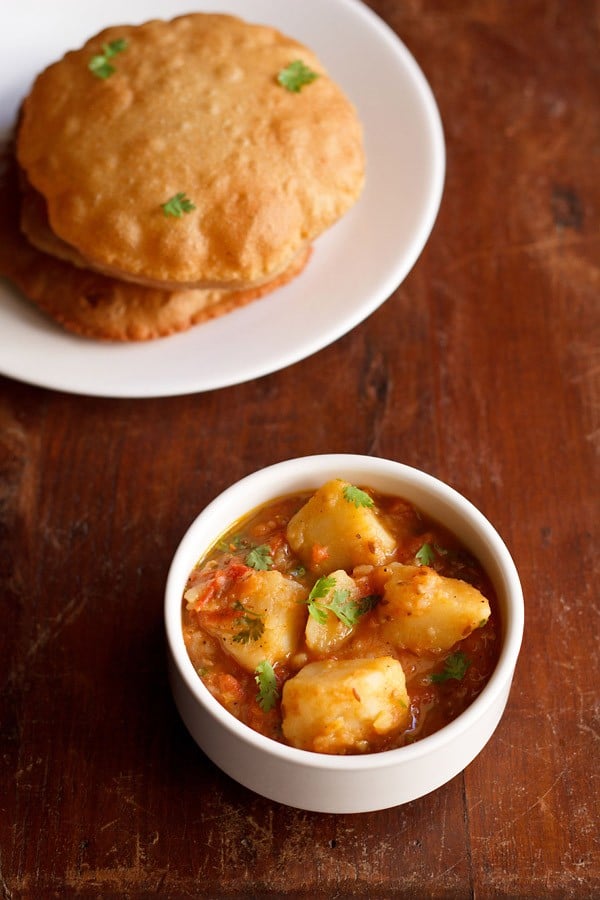
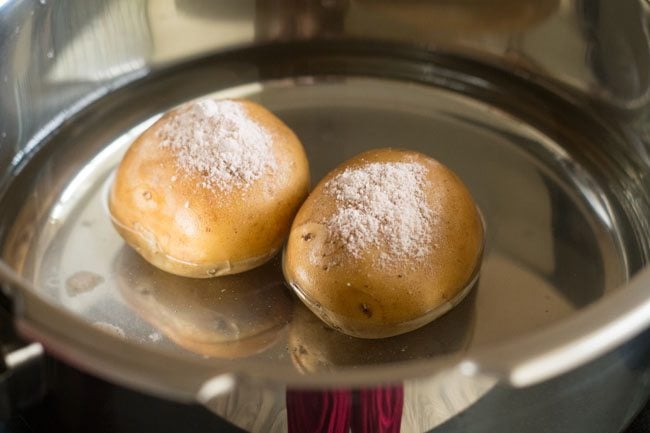
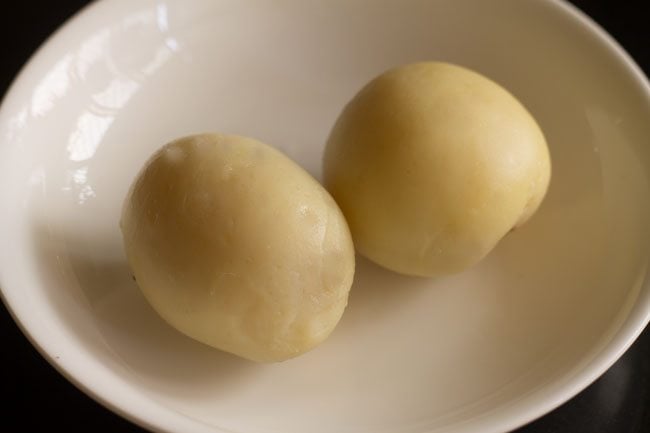
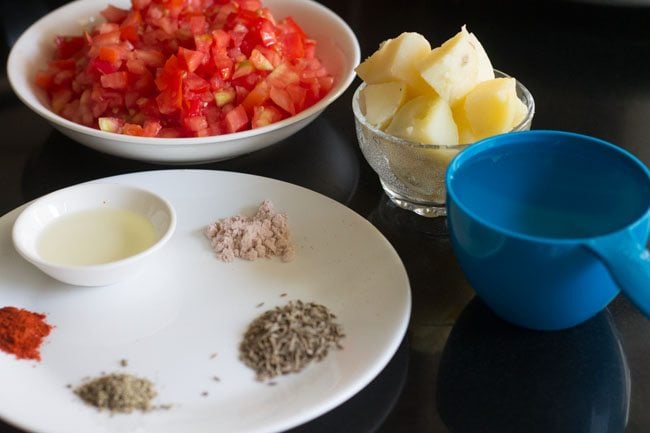
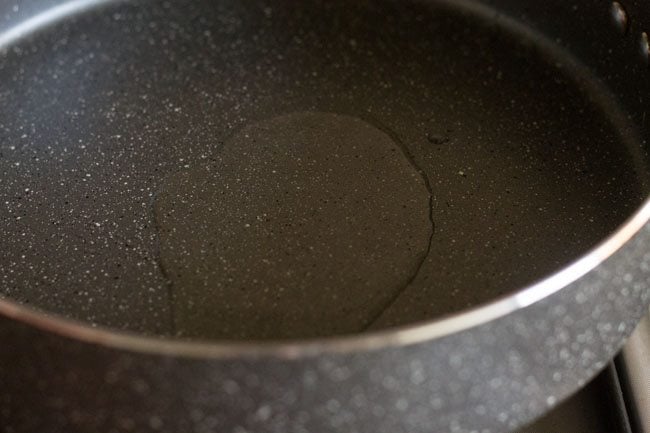
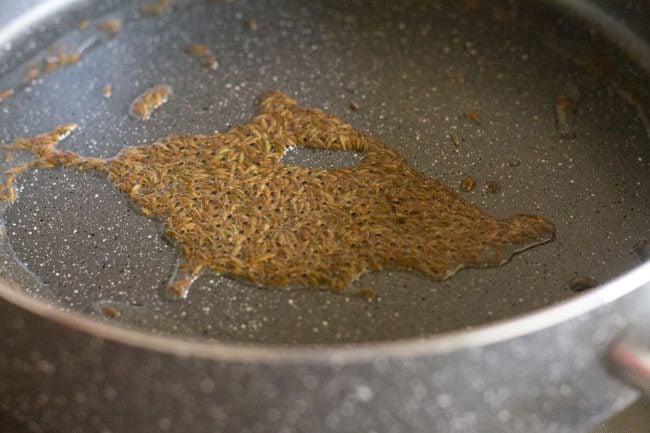
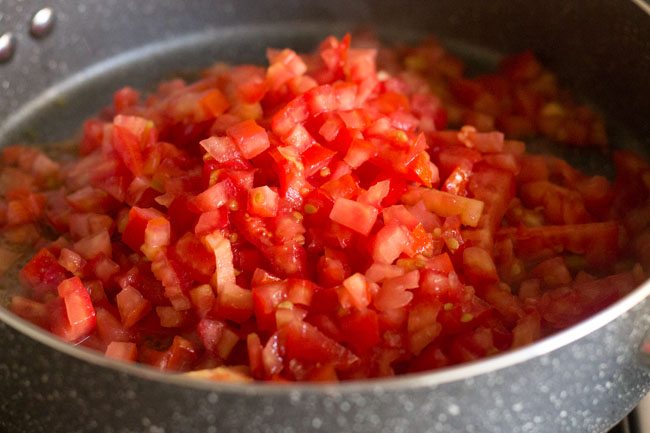
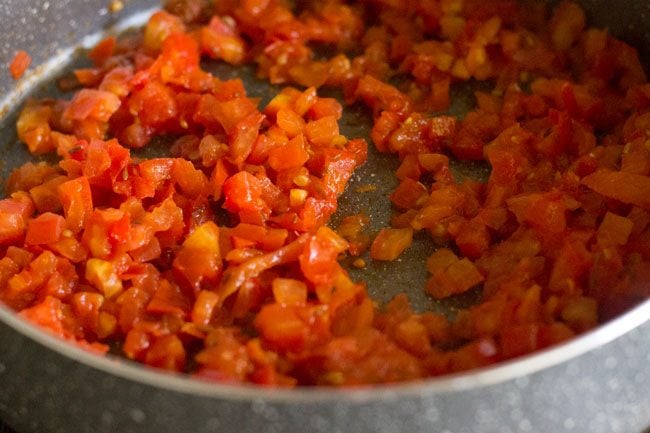
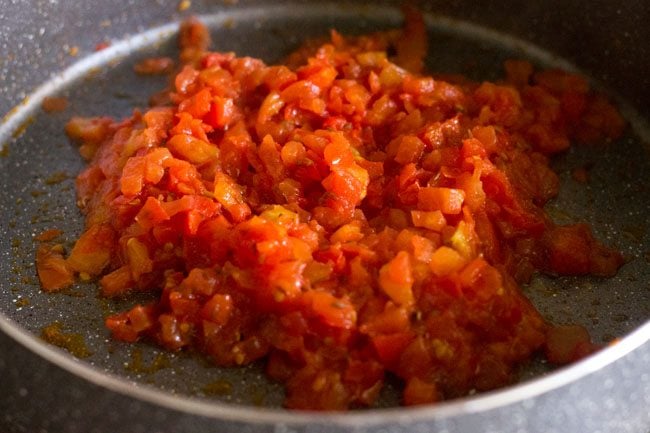
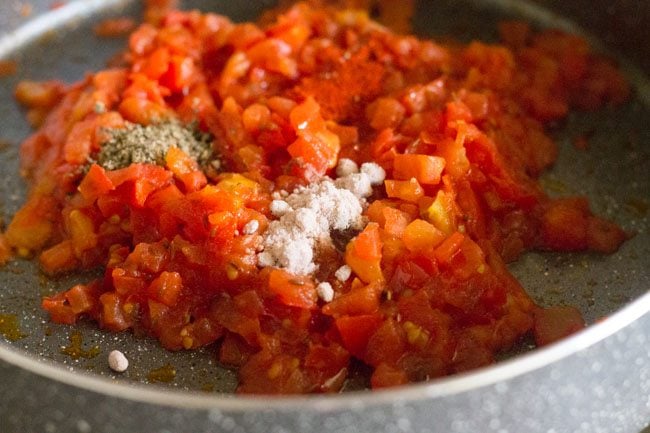
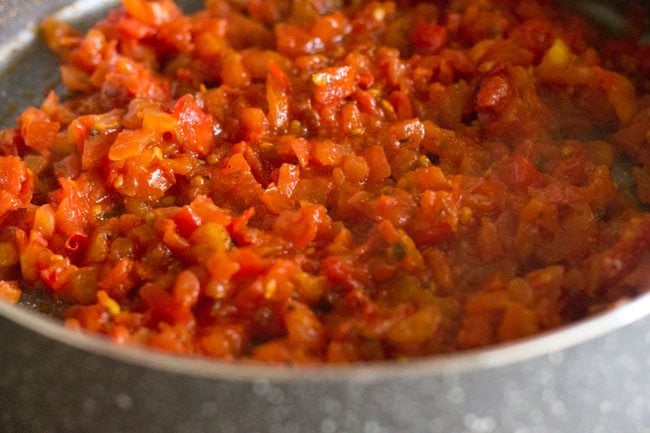
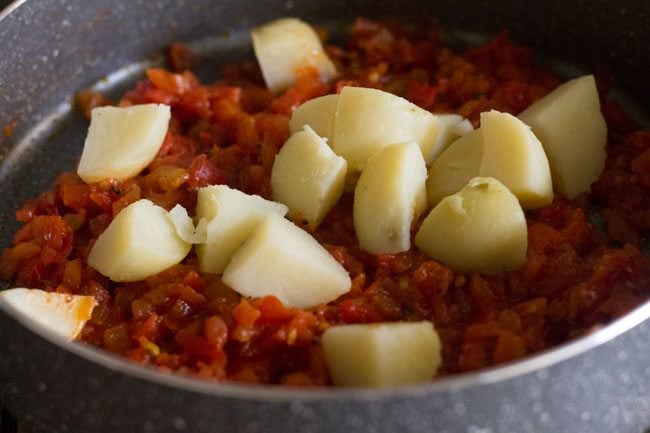
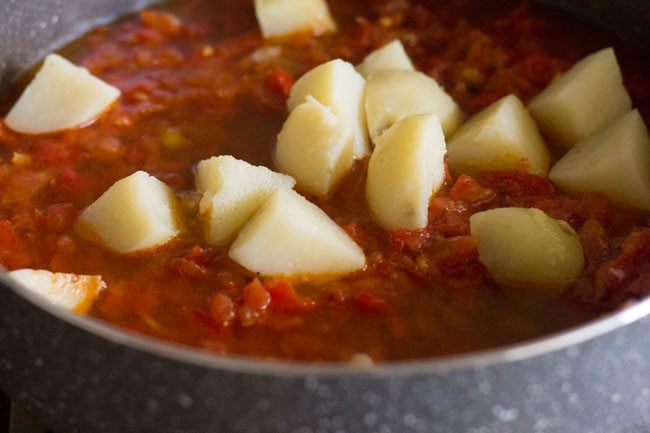
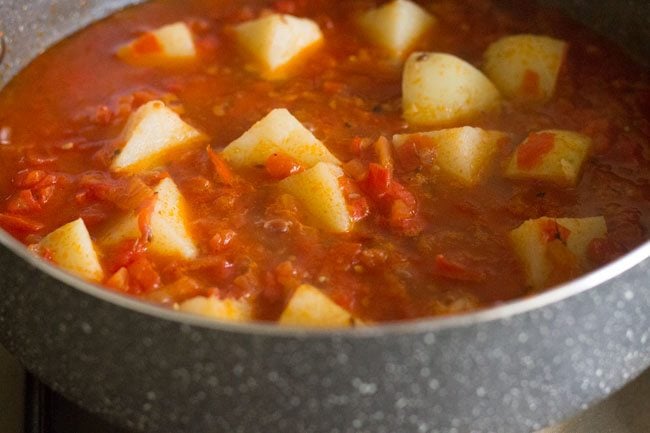
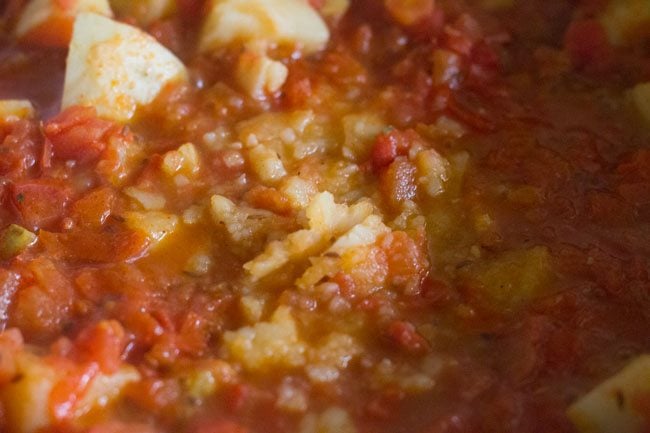

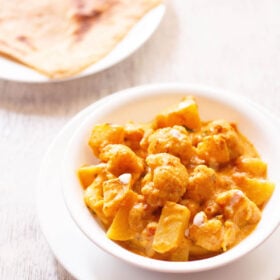
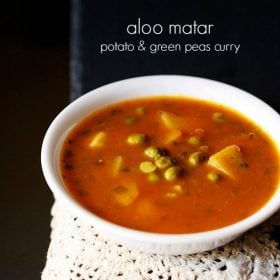

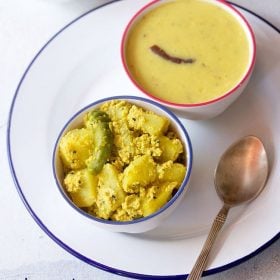
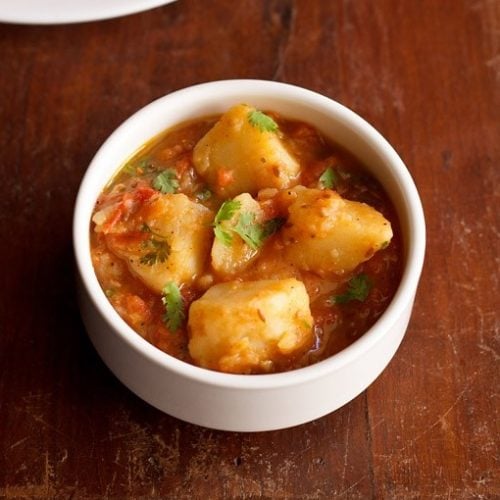
title: “Easy Aloo Ki Sabji Satvik Aloo Tamatar Ki Sabji” ShowToc: true date: “2024-09-30” author: “Beverly Vescio”
About Aloo ki Sabji
There’s hardly anytime that you can go wrong with either potatoes, tomatoes or a combination of both. Especially in Indian cuisine, these 2 vegetables are the simplest to work with, yet make for amazingly delicious dishes. At home as well, the pairing like in this Aloo Tamatar Ki Sabji makes for a comforting dish. I’ve said this in my other posts, but I’m going to reiterate – it is almost a critical situation at home, if there is no aloo or tamatar in my vegetable tray. Whether other veggies are there or no, these two have to be there always. Like, literally always! And the simplest way I can bring these 2 together in a dish is this Aloo Tamatar Sabzi. Also, whether I’m keeping a fast or not, I often make this Aloo ki Sabji for my family. The fact that it is a fancy free, low on spices and light curry is what makes it special. Sometimes, you have days when you just want to eat a curry, but a soothing one. And not the typical rich one. Those days, this Aloo Tamatar Sabzi is a savior. I’m saying this again, a potato or aloo is a very friendly and handy vegetable, especially for home cooks. This root vegetable is good on its own or in company with other veggies/leafy greens like green peas, tomatoes, carrots, spinach, cauliflower, beans, fenugreek leaves, capsicum and more. Usually, I make this Aloo Tamatar Ki Sabji with pooris and often as a breakfast. But, for that set up, I tend to add onion and garlic in it. Since the recipe in this particular post is dedicated to Navratri fasting, I have made the recipe without onion, garlic and spiced it just with cumin, red chili powder and black pepper powder. So, when you make the Aloo Tamatar ki Sabji this way, you can serve and relish it with similar vrat friendly accompaniments like Vrat Ki Roti, Singhare Ki Poori, Rajgira Paratha or Rajgire Ki Poori. I also have another potato-based dish apt for your fasts, called the Vrat Ke Aloo, which is equally tasty.
How to make Aloo ki Sabji
Cook Potatoes
- Pour 1.25 to 1.5 cups water in a 2-liter stovetop pressure cooker or pan. Rinse well in water a few times and add the 2 medium-sized potatoes and some edible rock salt (sendha namak). Boil the potatoes for 2 to 3 whistles on medium-heat. The potatoes should be just cooked. They should not become crumbly or mushy. Let the pressure drop naturally in the cooker, then only open the lid. Remove the cooked potatoes and set aside to cool.
- Let the potatoes cool slightly or become warm. Peel and chop them.
- Keep all the ingredients ready for making Aloo Tamatar Sabzi.
Make Aloo Tamatar Ki Sabji
- Heat 1 tablespoon oil in a pan. You can also swap the oil with ghee if you prefer.
- Add 1 teaspoon of cumin seeds and let them splutter on low heat.
- Then, add 4 medium sized chopped tomatoes – about 2 cups of finely chopped tomatoes.
- Sauté till they become soft stirring often on medium-low to medium heat.
- Continue to sauté the tomatoes till they soften and become pulpy.
- Then, add ¼ teaspoon red chilli powder, ¼ teaspoon black pepper and edible rock salt as required. You can also add regular salt if not making for fasting.
- Stir and mix well to combine.
- Add the chopped boiled potatoes and stir to mix again.
- Add 1 cup of water.
- Stir and let the gravy cook on low heat for 7 to 8 minutes or till it thickens slightly.
- Slightly mash a few potato pieces with a spoon to help in thickening the gravy.
- Garnish with chopped coriander leaves and serve Aloo Tamatar ki Sabji hot or warm with your preferred flatbread like roti or paratha or puri. Please be sure to rate the recipe in the recipe card or leave a comment below if you have made it. For more vegetarian inspirations, Sign Up for my emails or follow me on Instagram, Youtube, Facebook, Pinterest or Twitter. Aloo Gobi (2 Ways) | Aloo Gobi ki Sabji & Curry Aloo Matar Recipe | Punjabi Aloo Mutter Easy Jeera Aloo Recipe in 30 minutes Aloo Posto Recipe This Aloo ki Sabji from the archives first published in October 2013 has been updated and republished on December 2022.




















